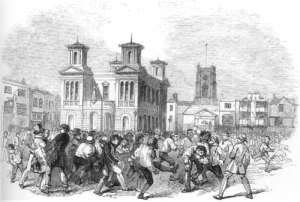600 Glorious Years of Beastlie Furie and Extreme Violence

From medieval times right through to the Nineteenth century, football battled against various attempts to suppress it.
Highlights include:
1287: Synod of Exeter bans "unseemly sports" from churchyards
1314: Edward II's ministers issue a proclamation stating that "forasmuch as there is a great noise in the city caused by Hustling over large balls, from which many evils may arise, which God forbid, we command and forbid, on behalf of the King, on pain of imprisonment, such game to be used in the city in future."
1349: Edward III repeats the prohibition, describing football as one of many "foolish games which are of no use". Further decrees against football follow in 1389 and 1401.
1531: Sir Thomas Elyot writes in his treatise The Boke Named The Governour that football is "nothing but beastlie furie and extreme violence".
1555: Football is banned at Oxford University.
1572: Elizabeth I passes a decree that "No football play to be used or suffered within the City of London".
1576: A group of artisans in Ruislip "with unknown malefactors to the number of a hundred, assembled themselves unlawfully and played a certain unlawful game, called football, by reason of which unlawful game there arose amongst them great affray, likely to result in homicides and serious accidents."
1608-9: Reports in Manchester of "a companye of lewde and disordered persons using that unlawful exercise of playinge with the footbale in ye streets of the a said towne breakinge many men's windows and glasse..."
1615: Football is said to be causing "greate disorders and tumults" in the City of London.
1600s: "In many respects Puritanism in that period became a greater enemy of sport, especially of the popular, bloody variety, than medieval monasticism had been, and the history of sport in Puritan England could be written largely in terms of the regular enactments against it."
The Puritan pamphleteer Philip Stubbes writes that football is more "a bloody murthering practice than a fellowly sport or pastime".
1660: It is alleged of an undergraduate at Cambridge University that "he was in a companie that did in a Riotous manner throw clotts or stones at the deputy proctor and Masters of Arts who came to prevent scholars from playing at football, and other disorderly meetings there."
1796: After the death of a man in Derby's Shrove Tuesday game, football is condemned as "disgraceful to humanity and civilisation, subversive of good order and Government and destructive of the Morals, Properties and very lives of our Inhabitants."
1830s: "The days had gone when authorities stood by helplessly while their subjects took the law into their own hands with impunity; in the capital for instance bands of footballers ceased to be able to create mayhem at will. Street football in the old cities was one of the victims of effective law enforcement."
1838: "Football seems to have almost gone out of use with the inclosure of wastes and commons, requiring a wide space for its exercise."
1881: Evard Home Coleman reports: "The ancient custom of playing at football in the public streets was observed at Nuneaton on the afternoon of March 1st. During the morning a number of labourers canvassed the town for subscriptions and between one and two o'clock the ball was started, hundreds of roughs assembling and kicking it through the streets. The police attempted to stop the game, but were somewhat roughly handled."

Category: Football_






2 Comments:
Plus ca change, plus c'est le meme chose!
Just in case you think I'm an ignoramus (well more of one) I couldn't include the cidilla - this PC seems to have discarded its francophilia since I was posting in Anglo Saxon a little while ago...Shows taste anyway...
Post a Comment
<< Home